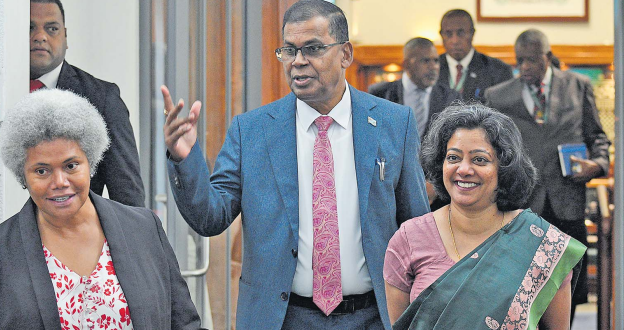The Coalition Government yesterday delivered a bold and expansionary 2025-2026 National Budget, with an ambitious plan to drive economic resilience through record investment in infrastructure, agriculture and healthcare, while providing relief to households and boosting private sector confidence.
It builds on wide-ranging reforms introduced since 2023, including pay rises for civil servants, restored pensions for FNPF retirees, increased cane prices for farmers, debt write-offs for 53,000 tertiary students, and the restoration of media freedom and civil liberties.
“Our government did not create the unsustainable public debt that we inherited in 2022,” said Deputy Prime Minister Professor Biman Prasad.
“But it is our job to manage it and we have done so responsibly.”
He said the $4.8billion budget backed by $3.9billion in revenue and a projected net deficit of $886million, or 6 per cent of GDP is “deliberate and measured,” designed to shield Fijians from global economic shocks and rebuild fiscal buffers.
“It reflects the bold decisions we are making today to protect our people, make our economy more resilient and continue to build our much-needed infrastructure and productive capacity,” Prof Prasad told Parliament.
Fiji’s economy grew by 7.5 per cent in 2023 and 4 per cent in 2024, driven by strong tourism, household consumption and public investment.
The economy is forecast to grow by 3.2 per cent in 2025 despite global uncertainty.
Prof Prasad said the rapid post-pandemic recovery had helped rebuild confidence and created space for targeted government spending.
“We kept our actual deficits at an average of around three per cent, lower than budgeted and much lower than under the previous regime,” he said.
Inflation has declined sharply from 5.1 per cent in 2023 to just 1.3 per cent in 2024 and stood at 0.1 per cent as of May 2025.
To further relieve the cost of living, the Government will reduce Value Added Tax (VAT) from 15 per cent to 12.5 per cent effective August 1, 2025, delivering an estimated $250 million in tax relief.
This is in addition to $250million worth of relief already provided over the last two years through zero-rating of 22 essential items including flour, sugar, rice, cooking oil, baby formula, and medicines.
Meanwhile, the budget outlines 177 active development projects valued at $5.8billion.
Sixteen projects have already begun operations, with 73 under construction.
These include the Google submarine cable project, an 80-acre pilot by FIJI Water in Vanua Levu, major resort developments in Nadi, Labasa and Rakiraki, and the expansion of coffee farming in Ra.
“These signal a promising pipeline of investments,” said Prof Prasad.
To support economic activity, the Government has prioritised policy stability, tax certainty and streamlined approval systems.
“Our aim is to ensure that we have economic and fiscal policies which are transparent and predictable, not secrets to be kept back until the last minute,” said Prof Prasad.
Foreign reserves are steady at $3.7billion and banking system liquidity at $2.1billion.
Non-performing loans have declined, and Fiji’s financial system remains “strong and well-capitalised”.
While global instability, particularly in the Middle East and shifting US trade policies has led the Macroeconomic Committee to trim the 2025 growth forecast to 3.2 per cent, the minister said Fiji was in a better position to withstand external shocks.
“We have created the fiscal space which will help us navigate through this uncertain global environment,” Prof Prasad said.
“We are therefore proactive and have formulated the budget in anticipation of these global headwinds.”



